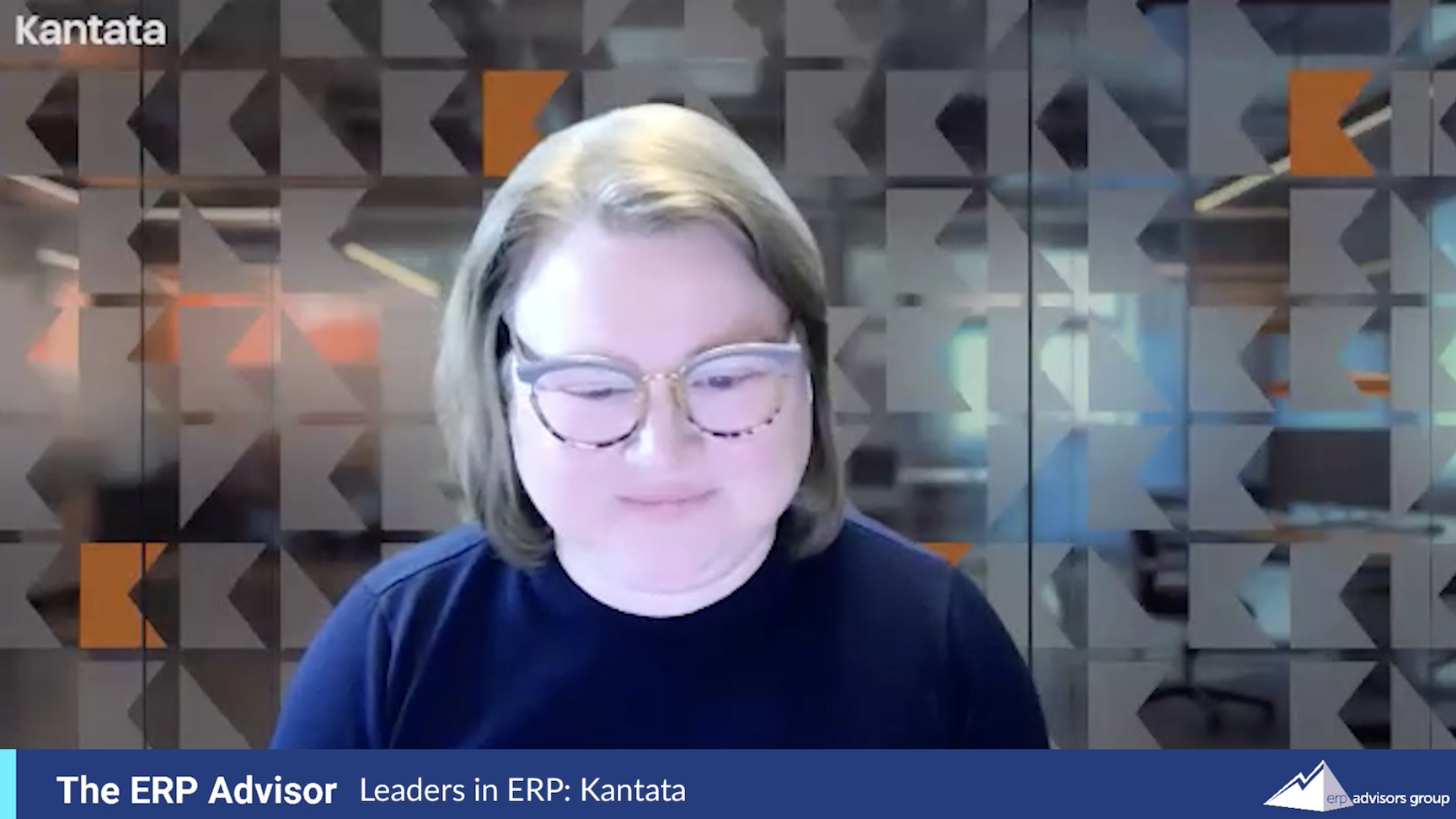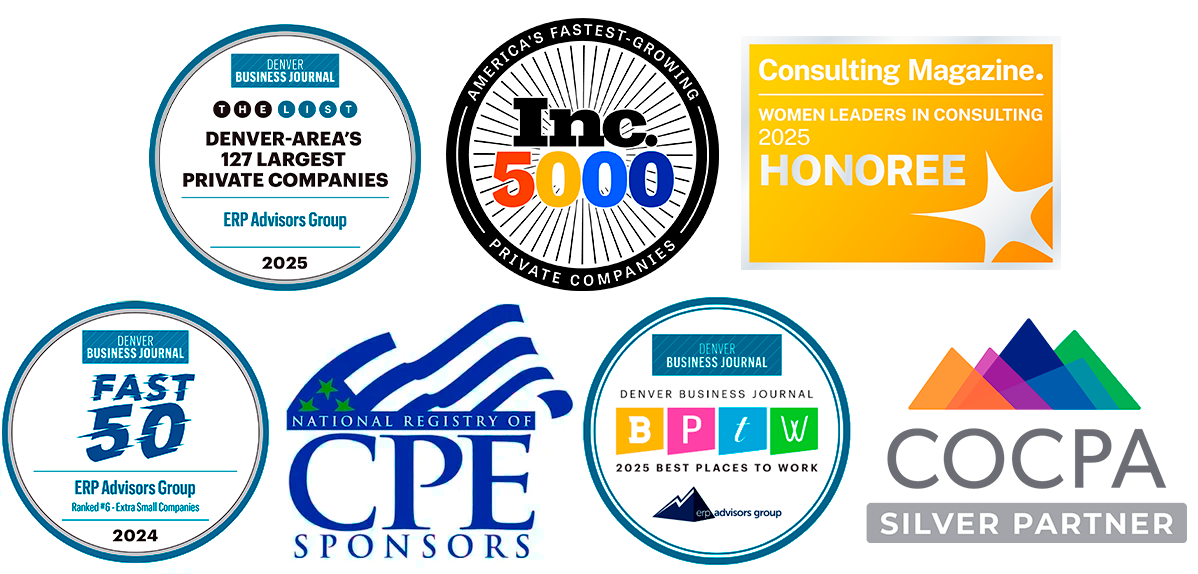
For 50 years, Epicor has created industry-specific software solutions and services that aid businesses across the world. Scuderia AlphaTauri, a Formula 1 racing team, is a notable partner of Epicor, proving they can provide solutions in innovative and unique ways. Tune in to this installment of The ERP Advisor for an overview of Epicor's differentiators in the market.
Epicor
In 2020, Epicor Software Corporation was sold by its investors at KKR to the private equity firm Clayton, Dubilier, & Rice (CD&R). From a number standpoint, Epicor employs over 4,100 people located in 150 countries across the world. As of 2022, Epicor has 21,000+ customers with over 250,000 cloud users and generates more than $1 billion dollars per year in total revenue.
What Does Epicor Sell?
Epicor describes itself as a producer of industry-specific productivity solutions in the form of ERP software solutions. Over the years, Epicor has developed or acquired many industry-specific software solutions, specializing their enterprise platforms for the Manufacturing, Distribution, Retail, and Automotive industries including Industrial Machinery, Electronics, Medical Device, and more. Most of Epicor’s offerings fall into the 2nd and 3rd tiers of the ERP pricing model.
In addition to their ERP solutions, Epicor’s unique offerings expand across Customer Relationship Management, Digital Transformation, Security, Supply Chain Management, Production, and Financials. Like other software vendors in the market, Epicor supplies its offerings in both SaaS (Software-as-a-Service) and on-premises deployment models.
Epicor’s offering of specialized solutions for lumber and building materials businesses is unique to the ERP space as very few companies offer such narrowed specialization for this field. Epicor BisTrack Global is built to deliver the reporting, mobility, and delivery management solutions required by lumber and building materials companies to meet strenuous standards and quotas. Epicor LumberTrack takes the specialization one step further, improving visibility for lumber businesses to analyze and optimize operations.
Epicor puts significant focus on solutions for the Automotive industry. Epicor Eagle for the Aftermarket and Epicor Vision are Epicor’s go-to automotive solutions, with strong analytics, inventory management, and more feature functionality to drive automotive process automation.
Epicor offers general solutions beyond its extremely specialized platforms through Epicor Eagle and Epicor Propello for retail. The point-of-sale and retail management software crafted in Epicor Propello and Epicor Eagle simplify retail operations, with features like eCommerce and customer management.

What Kind of Partnership Ecosystem Do They Have?
ERP software vendors develop partnership programs to help contribute to the success of the implementation of their software solutions. Epicor’s ecosystem ranges from high-value resellers, best of breed ISV partners (Independent Software Vendors) to consultant firms that bring thought-leadership and best practices to our clients’ benefit.
ISVs partners write and sell software. These partners work with Epicor products and other ERP vendors, providing Epicor customers the ability to create the most effective environment for their business and value to their users on the solutions they implement. Conversely, the Channel partners are those that sell products and services and develop specialized vertical solutions on the platform. These partners implement products from multiple vendors but are experts in implementing Epicor.
Why Does Epicor Win Over Their Competitors?
In our experience, Epicor differentiates itself through its deep 50 years of ERP history and its niche offerings in specific industries such as automotive, building supplies, aerospace, and specialty distributors.
After being in the market for 50 years, Epicor has established a name for itself and has developed extensive knowledge to differentiate from other vendors with similar solutions. Their maturity in the industry has led to a loyal customer base and a knowledgeable channel that caters to their customers.
In addition, Epicor provides numerous options to satisfy unique needs in many industries. What differentiates Epicor is its specialization of solutions, so users feel that they are heard and accommodated for in a way that other ERP vendors cannot provide.
Conclusion
With over 50 years of software solution experience, very few ERP vendors have the actual knowledge of real-world needs that Epicor brings with their proven solutions. In addition, Epicor’s acquisitions introduce state-of-the-art technologies to their tenured small to mid-sized customers that are evaluating technology transformation projects. We hope Epicor continues its penchant for technology innovation long into the future.
Juliette: Hello, everyone thank you for joining us today. This summer, ERP Advisors Group is spotlighting the most prominent vendors in the ERP software market. Today we will be discussing Epicor and its offerings and providing key insights into our experiences with this vendor.
Welcome, Shawn, thanks so much for joining me I appreciate it.
Shawn: Yes, thank you.
Juliette: Yeah, so for over 50 years Epicor has created very specific industry-specific software solutions and services that help a variety of businesses across the world. So, with that, can you tell us a little bit overall what Epicor is about?
Shawn: Yeah, you bet. I think you nailed it right there by saying one of the biggest differentiators of Epicor is that they've been around for you know almost half a century, I think it actually is 1/2 a century this year. I'm not totally sure, but it's like 50 years that this organization has been writing software. Now of course it's gone through many, many different iterations, but Epicor as an organization, in its earlier groups and different solutions, has really led in the small, medium size ERP space for a long time. So that's when I think of Epicor, I do think that they have a rich tradition in enterprise software solutions and really built them from the ground up.
And they have lots of different industry-specific solutions, we'll talk about that I'm sure, but when I think of Epicor, I really do think of a deep kind of heritage in ERP. Now you can still get some punk salesperson from Epicor or from a partner that's trying to sell you Epicor, that's just one individual, but if you look at the whole organization, I think there's a lot of rich heritage in ERP there for sure.
Juliette: Yeah, so what do they sell specifically, or just overall like are they very industry-specific or can they be more general and then customize to work for a business and their needs?
Shawn: That's a good question and it's very applicable for Epicor. Their solutions have sort of traditionally focused on very specific verticals or industries or even micro verticals or industries. So, anything from packaging companies that build packaging materials like cardboard boxes, other things like that, there are solutions for that. There are very specific solutions for the automotive industry; very specific solutions for even selling lumber. They have some solutions that they purchased over the years to focus in very, very micro-verticals.
And they have a couple of platforms that are more general but still specific to, I would say engineer to order discrete manufacturing and wholesale distribution. So, if you're in those two categories, you might look at Kinetic or the Prophet 21 solution. Kinetic on the manufacturing side and then Prophet 21 on the distribution side; so, they're more general in those two areas, but that's still kind of specific if that makes sense.
Juliette: It makes perfect sense. So, I know there are a variety of different softwares out there, is Epicor a gigantic platform? Do they have different size software packages you could buy for your business? Or is it pretty much you like you buy what you get kind of thing?
Shawn: Great question. They're not a huge business, although their recurring revenue is almost at a billion, that was a big deal; we were just at the conference and the CEO was talking about that. So, I mean that's a great size software company, but in this industry, you know, we talk about Infor, we talk about Oracle or SAP, you know those are multi multi-billion-dollar organizations. So, Epicor is still, I would say, a good medium-sized ERP vendor.
And they've got a great customer base, but you know more in the 10s of thousands, you know 20-30 thousand or so as from the research that we've done. They have employees in a lot of different countries you know maybe under 5000 employees. So, you can sort of get the feel for an organization that's not mammoth right?
They're not one of the top ERP vendors in terms of size, but they've got a lot of good momentum, they've got a good, strong base they're building on their enterprise apps from, and they've had enterprise apps for a long time. You know, they've got thousands of people developing on those platforms as well as, and we'll talk more about this, one of the differentiators we see with Epicor is they are reinvesting that recurring revenue with a lot of really cool acquisitions. It's a good firm, it's not huge, but it's definitely not tiny either.
Juliette: Right, so what are their most prominent features? Can you share a little bit about that with us?
Shawn: Yeah, so again, if you sort of think high level, we have manufacturing for sure, more discreet, more engineer to order, then we have some sort of distributor kind of software. Then we can go down deeper, right, especially on the distributor side on building materials for automotive, as I mentioned; and some other areas too that they focus on. With manufacturing, there are some great partner solutions that have built aerospace and design-specific functionality for that engineering-to-order environment. When we think of Epicor and very specific micro-vertical areas, it's hard to beat because the functionality is really good. Those are definitely some of the key areas they differentiate in for sure.
Juliette: Well, can we talk about the type of partner ecosystem that Epicor has?
Shawn: Yeah, let's do it. So, they basically have a couple of different kinds of partners. They have some partners that write solutions that work within the Epicor technology kind of environment. They're called independent software vendor partners, who built ISV solutions.
Then we have channel partners that implement, sell the software, and implement the software. There are a couple of channel partners that we work with, pretty exclusively, because they're a great size, they have really great industry experience, specifically for the kinetic product, which is the new Epicor 10, the new ERP for manufacturing.
They're strong partners; Epicenter and Creative are two very well thought of partners in that space. We've engaged with both of them before on different deals, we like them a lot. They take great care of their customers, and they've got a lot of experience.
There are a lot of other Epicor partners out there for sure, but we have seen, unlike maybe say Infor, where the partners are very tried and true to the Infor products they represent and sell, the Epicor partners have sort of shifted a little bit. Some of them have taken on some other products but there's been a couple, like I said, that exclusively, do Epicor and I think that's going to pay off for them. So, if you're looking for a partner for an Epicor solution, you really want to find somebody who's devoted to Epicor solutions. Whereas if they do three or four or five products, it's sort of hard to keep track of everything you know across those three or four or five products.
Like if they just do Epicor, I think that's it. That's a secret insider tip; we'll probably drop a couple of those this summer on these calls.
Especially in this area, you want to find a really good partner and the way to do that is to ask them for references. “I need 3 references,” and I swear to goodness some of them won't be able to provide it: that's a bad indicator.
But the guys and gals that do this all the time, like “Oh yeah, here’s three customers that we've worked with similar to you guys.”
Juliette: Right, and we know that ERP is a hugely competitive market, and from your experience of working with a variety of clients and just through the years, why does Epicor seem to win over their competitors?
Shawn: Good question, the industry fit is huge. So even micro verticals, like electronics distributors, they've got solutions that electronics distributors have been using forever; even companies that sell electronics to retail or whatever.
And automotive, they've got solutions in the automotive world with kind of interoperability amongst companies that nobody else has. So, if you're going to buy solutions in that space, you're going to buy Epicor. Building materials are the same thing. There's ETO or even other just general distribution kind of stuff you think Epicor.
But there is a lot of competition in the marketplace for sure and a lot of those companies are going to look outside and see if there are other solutions maybe like in NetSuite, that's a little more general but can be verticalized for these specific industries.
Epicor’s customer base tends to be kind of cheap. They don't really want to spend a lot of money on technology, if you think about a distributor business especially, a distributor makes a margin on the difference between what they buy something for and what they sell it for. Their profit margins are razor low; they just are. And they've got warehousing expenses, personnel, all this other stuff, so for them to go out and buy a really expensive ERP that does this much, versus Epicor that's very well priced and it does that much. They're going to go with that solution because there are not necessarily a lot of margins they can play with.
So, I think it's a big advantage that Epicor has, and I think this is the reason why they've just recently changed hands on the private equity side. This is because their new partner CD and R saw they have a very loyal customer base. That customer base does not want to change technology unless they absolutely have to, and then Epicor has the right migration path from their older solutions onto something that is more cloud-based.
Juliette: Right, so Shawn from your experience, do people, if they start out with Epicor, tend to stay with Epicor and transition to the cloud? Or are there a lot of people transitioning from something else to Epicor?
Shawn: Definitely the former. A lot of Epicor customers, legacy Epicor customers, are making that transition to the cloud for sure. Epicor has done a good job of putting together a cloud-based solution where a company doesn't have to worry about the maintenance and support of the environmental software security around the system itself. It's at a data center, and I want to say it's mostly Azure they do some with the Microsoft platform.
Epicor has been a huge partner with Microsoft for years and years and years; that's a good thing. You do see a lot of legacy Epicor customers stay with Epicor and just do the upgrade, they're done, and they move on with their lives. But we are seeing customers that are looking at Epicor that are coming off of other platforms, especially something that's smaller like QuickBooks or maybe some of the older Sage products, and they want more functionality.
We do see a migration towards Epicor for sure, and the tricky part with Epicor, this is a really good tip for folks that are listening and thinking about Epicor, is you really want to make sure you get the right implementation team because the software is good, especially for these micro verticals we talked about, but success really comes down to the implementation partner and the resources.
So, if you go to Epicor direct for the consultant team, fine, just meet with them. Make sure they're committed to your project, make sure they're locked in, and that the good guys and gals aren't going to go someplace during your project.
Juliette: Right, any tips on how to find that implementation partner to help you with Epicor?
Shawn: Well, we usually burn like a prayer candle and, no with interviews. You get down to the point where you're like “OK, we're going to do this with Epicor, we like the software, let's do the diligence on the services provider.” A lot of folks don't even know that they're like “oh, I chose Epicor. Great, let's start.” OK, well who's going to implement this? Because it's not like a car, where you buy the car and then you get in and drive it off. It's more like buying software, that's the best way to say it. It's like having a kid where you take the kids home and you're like “oh my goodness, I have to parent this kid.” Any parent who's listening to this had that feeling at some point with one of their children or they're like no one is going to tell me to do this. and if your mother-in-law is there, she might tell you or whoever, maybe your mom.
When they leave, there is some point where you're like “wow, I have to put this in.” It's kind of the same with software, like great, you bought the software, guess what? You got to put it in. Now everybody knows you, a customer or prospect who's looking at buying it, you don't have the experience and time to implement it. So, there's going to be some implementation solution the salesperson is going to sell you whether you know it or not. The thing you don't know is that you have choices and options there.
And you have a responsibility to interview those people, understand their methodology, make sure they know what they're talking about, and they understand your type of business, and that they're even interested in doing it. So, I do think in the Epicor channel specifically, you really do just have to be aware of who is doing your implementation and just make sure that they're qualified and they're locked in to do it. And if you meet some really good people from Epicor or professional services that you like before you buy the software, put their names into your contract.
“These are the people that are going to do my implementation. You're contractually obligated, Epicor, to have these people here to do this.”
Juliette: That's a great tip.
Shawn: It’s linkable across lots of different software solutions, but we got burned a long time ago with Epicor. I've talked to lots of people at Epicor about this, where we loved Epicor 9, great solution, it was actually the reason why I started this company, was because of Epicor. When I was with another firm, doing basically the same thing, we had selected Epicor three times and had three failed implementations. I said, “that's it, we have to be more involved in the implementation.” The firm I was with didn't want to go that path, and I think there were probably other reasons why they didn't want me around. I was a little bit of a troublemaker.
So, then I went “OK, fine, I'm going to start my own company,” and that's when I started ERP Advisors, was because of those three failed Epicor implementations. Now we can be involved on the implementation side because we don't have the CPA regulations about not being able to audit the financial systems we're implementing. Basically, that's a long story for another time.
Bottom line is that I'm just very weary with that organization, and we've found ways to work with them very successfully by just making sure you have really good resources that are committed to the success of your implementation.
Juliette: That's right. Well, we've talked several times through the years about how important picking the right implementation partner is because you're going to be spending a lot of time with them. And they're going to be holding your hand for many months, going live and getting through the implementation. You have to have a good team partnership for it to be successful, right?
Shawn: You have to, and that's why I'm so grateful that you were willing to do all these calls with me this summer on the vendor overviews because we cover tips that I don't even think about. I mean, it's built into our methodology. Whenever we do a selection for a client, the client has got to pay us for that. It's extra money, and not all clients can do it, but they can listen to these videos and learn really important things. This is one of those that is “don't just focus on the software.” A lot of folks will say to us "I didn't even know I had to care about the implementation people.”
Another analogy would be when I buy a car, “I didn't know I needed to think about the service people.” You don't really think about that when it comes to buying a car because you don't know where you're going to take it or you might go to the dealer, you might go to some independent shop because lots of people know how to work on a Toyota or a Ford or whatever. That's just not how this works. You have got to stop thinking about that, it's got to stop. You have to start thinking about the fact that it’s not just a couple of demos and select the software and buy it. Figure out what you need, and tell them they need to show you this stuff. There's a whole diligence on the software, and there are diligent steps that you have to take on the implementation.
Juliette: That's right. So, Shawn, can you talk to us a little bit about their pricing structure? Does Epicor have a pretty standard pricing structure or are they flexible how do they work with that?
Shawn: They have a super standard methodology on how they do pricing, similar to some of the others we've talked about, where there's a module price and user pricing. It's very straightforward and you get what you get and don't throw a fit. They say, here's what you're going to get, and if it's not on there, you're not going to get it.
So, you do have to make sure something like a fixed assets module or some advanced purchasing stuff, if you need those functionality pieces, they have to be listed on your order form. So, when you do all the diligence, you say “hey this is what we need for software,” and the software person says “ok, I'm going to put together an order form for you, and here's what's all on that.”
Now Epicor has moved all their pricing to be more recurring, so you pay the same each year. The software is hosted in the cloud, so you know your instance is in a cloud, which is nice, so you get that recurring cost. As I said, there's some pricing for users. Oftentimes if you get the professional services from Epicor, they'll put their pricing in there for that too. And you usually have a little bit of negotiation you can do when you buy the software, you can usually negotiate those services bill rates too, don't forget about that. But overall, it’s pretty standard and very competitive. Their pricing is very, very competitive right now for sure.
Juliette: Ok well, that's good to know for sure. So Shawn, from your experience of working with the different clients, are there any offerings that you would like to see Epicor have in the future?
Shawn: Yeah, they, well, one related thing I should say is I think Epicor is doing a really nice job of reinvesting their recurring revenue. Rebekah, our ERP minute person, we got that established, had an article recently about one software vendor who makes more money, I think than God, called Salesforce and had people like “Salesforce, you got to put the money into the market.” And they're doing a lot of great things, actually. I think they're probably leading in terms of their philanthropic activities and that. So that's great.
Now Epicor doesn't make as much as Salesforce or NSAP and Oracle, but what they are doing is they're taking their incremental cash flow, and they're investing in buying best-of-breed solutions. So, if you think about this, a software vendor has to bring a certain piece of functionality to the market. Their customers are saying “hey, we need configure, price, quote, so you can build by our partner.” Those are the three options back from my product management days at PeopleSoft and JD Edwards.
So build it, which takes a while to build something when you build it from scratch. You can buy it, somebody else has it, but then you got to bring it in and integrate it. Or you partner with somebody, and Epicor is really doing a good job with that buying and partners. So, they've got some solutions like their process automation solution to partnering with a best-of-breed vendor, and then they bought their CPQ. They bought another application recently too that Rebekah’s covering on our ERP minute; that's why those are so valuable.
And they're doing a good job with being innovative and they're also building some new stuff as well. So they've got a well balanced approach to how they're bringing more functionality to their customers and I like that. I love seeing it with software vendors. I mean it, it makes me so happy to see the software vendors investing in the future for their customers, and I really think Epicor is doing great at that. I really give my hats off to them for being that innovative for sure.
Juliette: That they're receptive to feedback, knowing their clients are needing something they couldn't necessarily provide, so they're able to find someone who can.
Shawn: Right. That's exactly right.
Juliette: Well, gosh, Shawn, thank you so much for joining me today and sharing all your amazing knowledge about ERP.
Shawn: Sure, you bet. I don't know if I’d say amazing, Juliette, it is. But I think I appreciate it because it's a good opportunity for me, to get to you and to everybody else, all the stuff that's in my head so that we can all make better decisions to better the industry, that's what this is really about.
Juliette: That's right, and you're a wealth of knowledge so thank you for that.
Juliette: So, as we continue our limited multi-part vendor series, be sure to join us as we share ERP knowledge. That will allow you to take advantage of over a century of combined ERP experience from our expert consultants here at ERP Advisors Group, thank you again for joining us.





